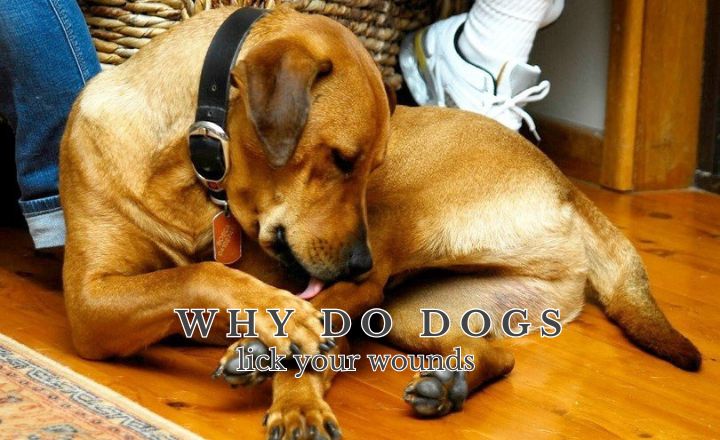Why do dogs lick your wounds? Exploring this instinctive behavior, as well as the benefits, risks, and how to prevent it. Can dog saliva heal wounds?
This age-old practice raises questions about the intersection of animal behaviour and human health should we welcome these slobbery healers or keep them at bay?
Join us as we delve into the fascinating world where love meets biology, unravelling why our furry friends might be more than just well-meaning bystanders when it comes to our injuries.
Why Do Dogs Lick Your Wounds

When your dog leans in to lick your wounds, it might seem like a strange act of affection, but there’s a fascinating blend of instinct and biology at play.
Dogs have an innate ability to sense pain and injury possibly due to their keen sense of smell. Through olfactory cues, they can detect changes in your body chemistry when you’re hurt, prompting them to respond with their instinct to heal.
This behaviour intertwines with the fact that canine saliva contains antimicrobial properties; it’s believed that saliva can help clean the wound and protect against infection.
Moreover, licking serves as a form of emotional support for both the pet and the owner. In moments of distress or injury, when you’re feeling vulnerable, your dog’s soothing presence can offer comfort.
This interaction fosters a deeper bond between you and your furry friend, allowing them to fulfil their role as compassionate companions.
Benefits Of Canine Saliva
Canine saliva is a remarkable substance, often overlooked in discussions about dog health and behaviour. One of its most fascinating benefits is its potential therapeutic properties.
Rich in proteins like hesitations and lysozyme, canine saliva exhibits antimicrobial properties that may help protect against infections for both dogs and their human companions.
Studies suggest that these proteins play a role in wound healing, offering a natural antibacterial defence. Imagine the bond deepened as your furry friend licks your small cuts or scrapes, potentially transferring healing agents that can expedite recovery.
Beyond physical health aspects, canine saliva also contributes to emotional well-being. The act of licking releases endorphins in dogs, which helps with stress relief and bonding between pets and their owners.
This simple gesture can foster trust and affection in the relationship while providing comfort during anxious moments for both parties.
Can Dog Saliva Cause Problems

Many dog owners might be surprised to learn that while canine saliva can have some beneficial properties, it can also pose certain health risks.
One of the most pressing concerns is the transmission of bacteria and viruses through dog saliva.
Canines often carry pathogens such as Pasteurella and Capnocytophaga, which can lead to infections in humans, particularly if a person has an open wound or compromised immune system.
This underscores the importance of hygiene practices after interactions with furry friends, especially during playtime when slobbery kisses are virtually guaranteed.
Moreover, dogs are known for their enthusiastic licks, but this behaviour can exacerbate allergies in sensitive individuals.
The proteins found in dog saliva may trigger allergic reactions ranging from skin irritations to respiratory issues for some people.
Read this article related to dogs behaviour Why Dogs Love Tennis Balls?
How To Stop My Dog From Licking Wounds
To effectively discourage your dog from licking wounds, it’s essential to tap into their instincts while providing comfort in other ways.
First, consider using a specialized veterinary-grade wound dressing that not only protects the injury but also has a texture or scent that deters licking.
Dogs often respond better to stimuli than restrictions; therefore, creating an environment where they feel safe yet distracted can be pivotal.
Plush toys infused with calming scents or interactive puzzles can keep their minds occupied and lead them away from the temptation to lick.
Moreover, incorporating positive reinforcement techniques can work wonders. When you notice your dog refraining from licking the wound for even short periods, reward them with treats or praise his encourages them to maintain that behaviour.
Regular check-ins during recovery time also help; zoning in on your pet’s emotional well-being is crucial as stress can heighten their urge to lick.
Final Thoughts
While dogs have been known to have saliva that contains some antibacterial properties, relying on it for wound care can be a double-edged sword.
Dogs often explore their environment with their mouths, exposing them to bacteria and pathogens that could easily be transferred to human wounds.
This potential for infection speaks volumes about the risks of depending on canine saliva as a healing aid.
Moreover, modern medicine provides us with advanced antiseptics and wound care options designed not only to promote healing but also to prevent complications.
Imagine the peace of mind you experience when treating cuts or scrapes with medically approved solutions like hydrogel bandages or antibiotic ointments.
These products are formulated based on exhaustive research and clinical studies, ensuring they effectively block harmful bacteria while fostering an optimal healing environment.
By choosing modern treatments over dog saliva, you opt for safety and scientifically backed efficacy in your healthcare routine.

